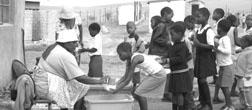Monday, August 15, 2005
My First Day in ARV
Today was my first day to be part of the ARV (antiretroviral) team. In the previous two weeks, I worked with Dr. Hla Tun in the Outpatient Department (OPD) handling the medical treatment of the chronic and acute patients and occasionally referring patients for ARV therapy. Now I will encounter those same referred patients in the ARV clinic. I’ll sketch out what takes place between the moment the HIV/AIDS patient enters the OPD and the beginning of ARV therapy.
Case Presentation: A 29 y.o male wheeled into the OPD clinic by a friend or relative presents with a dull ghastly look and weeks of persistent diarrhea. He appears lethargic, emaciated, and uninterested. There’s an occasional weak cough covering his nearly inaudible voice. The supporter then tells an unclear story of loss of appetite, and wasting for the past several months. The loss of appetite is compounded with dysphagia (difficulty swallowing) and some white growth on the tongue. Some numerous raised hyperpigmented lesions cover his chest and the lymph nodes are prominent around the neck. Unfortunately the use of traditional Zulu medicine have not helped him, but made him sicker. He had worked in Johannesburg, but has returned to Nongoma to be with his family. Likely his friends and family suspect what is causing his problems, but no one speaks of it.
And we, the doctors, suspect that he likely has full blown AIDS with TB, but we don’t speak of it or at least not in those terms. Like many of the patients in the KwaZulu-Natal Province, he presents at the latter stages of AIDS, meaning that the virus festered in the body for the past several years. At this point, he cannot hide from the self-destruction of his own body and is willing to receive treatment.
At the OPD, we only begin the process. We test him. Due to resource and time, two rapid HIV tests are done – no ELISA or Western Blot like in the US definitively verify his HIV status. We also collect sputum to do AFB test to check his TB status – no mantoux test (PPD) because TB is ubiquitous so that a PPD will likely cause a false positive ( I will likely turn positive when I come to the states with all the coughing that occurs around me.). We also send blood to Durban to do a CD4 count and wait for 2 weeks for the results. Finally we send the patient to Voluntary Counseling and Treatment (VCT) to initiate education. We biopsy the hyperpigmented lesions for possible Karposi Sarcoma, an ominous sign of late stage AIDS and wait for 1 month for results. We prescribe him some Bactrim as a prophylactic for possible opportunistic infection and t. We ask him to come back in two weeks and hope that he returns in order to tell him his CD4 count.
If the gentleman returns and the CD4 count dips below 200 cells/mircoliter, we commence ARV treatment and send him to the ARV clinic. Otherwise, with CD4 counts above 200 we ask the patient to have regular check ups in the OPD and recheck the CD4 count every six months. However, exceptions rule the ARV land. If the patient is TB positive, we postpone ARV treatment and treat TB first. Treating the TB first will actually increase the CD4 count. If the count is above 200, but we later find out the lesions are in fact Karposi Sarcomas, then we commence ARV treatment. More exceptions are around the corner, but I will not bore you with them.
So the count is below 200 and TB is positive, now we begin assessing if this patient is prepared to follow a strict regimen of multiple drugs for the rest of his life. That is, we must know if he can adhere to the medications. If there is a chance he defaults, we will not treat him with ARVs. He must complete four educational courses over a four week period and bring a supporter for future ARV check ups. Also he must meet with the physiologist, the social worker, and the dietitian. With the TB, he must be completely adherent with the meds for 2 months with regular check ups at the ARV clinic. He must be adherent with his bactrim treatment by returning to the clinic every week. If he defaults, at any point, he loses the opportunity to receive the ARVs. The clinic is strict with these rules because lack of adherence brings about medication resistance, ineffective therapy, and loss of resources.
Finally, if he rounds all the bases, we check his baseline liver function, repeat an x-ray for TB and Pneumocystis Carinii Pneumonia (PCP), check his STD status, check his electrolytes, and then begin to heal his body like the 470 other patients that have come before him in this clinic.
ARV treatment seems like a simple flowchart, but therapy changes every year as research studies provide more knowledge. Physicians must be updated and follow South African guidelines. These guidelines are not protocols because of the individual complexity and host of problems/situations, like pregnancy and allergic/adverse reactions.
Simple, right?
Case Presentation: A 29 y.o male wheeled into the OPD clinic by a friend or relative presents with a dull ghastly look and weeks of persistent diarrhea. He appears lethargic, emaciated, and uninterested. There’s an occasional weak cough covering his nearly inaudible voice. The supporter then tells an unclear story of loss of appetite, and wasting for the past several months. The loss of appetite is compounded with dysphagia (difficulty swallowing) and some white growth on the tongue. Some numerous raised hyperpigmented lesions cover his chest and the lymph nodes are prominent around the neck. Unfortunately the use of traditional Zulu medicine have not helped him, but made him sicker. He had worked in Johannesburg, but has returned to Nongoma to be with his family. Likely his friends and family suspect what is causing his problems, but no one speaks of it.
And we, the doctors, suspect that he likely has full blown AIDS with TB, but we don’t speak of it or at least not in those terms. Like many of the patients in the KwaZulu-Natal Province, he presents at the latter stages of AIDS, meaning that the virus festered in the body for the past several years. At this point, he cannot hide from the self-destruction of his own body and is willing to receive treatment.
At the OPD, we only begin the process. We test him. Due to resource and time, two rapid HIV tests are done – no ELISA or Western Blot like in the US definitively verify his HIV status. We also collect sputum to do AFB test to check his TB status – no mantoux test (PPD) because TB is ubiquitous so that a PPD will likely cause a false positive ( I will likely turn positive when I come to the states with all the coughing that occurs around me.). We also send blood to Durban to do a CD4 count and wait for 2 weeks for the results. Finally we send the patient to Voluntary Counseling and Treatment (VCT) to initiate education. We biopsy the hyperpigmented lesions for possible Karposi Sarcoma, an ominous sign of late stage AIDS and wait for 1 month for results. We prescribe him some Bactrim as a prophylactic for possible opportunistic infection and t. We ask him to come back in two weeks and hope that he returns in order to tell him his CD4 count.
If the gentleman returns and the CD4 count dips below 200 cells/mircoliter, we commence ARV treatment and send him to the ARV clinic. Otherwise, with CD4 counts above 200 we ask the patient to have regular check ups in the OPD and recheck the CD4 count every six months. However, exceptions rule the ARV land. If the patient is TB positive, we postpone ARV treatment and treat TB first. Treating the TB first will actually increase the CD4 count. If the count is above 200, but we later find out the lesions are in fact Karposi Sarcomas, then we commence ARV treatment. More exceptions are around the corner, but I will not bore you with them.
So the count is below 200 and TB is positive, now we begin assessing if this patient is prepared to follow a strict regimen of multiple drugs for the rest of his life. That is, we must know if he can adhere to the medications. If there is a chance he defaults, we will not treat him with ARVs. He must complete four educational courses over a four week period and bring a supporter for future ARV check ups. Also he must meet with the physiologist, the social worker, and the dietitian. With the TB, he must be completely adherent with the meds for 2 months with regular check ups at the ARV clinic. He must be adherent with his bactrim treatment by returning to the clinic every week. If he defaults, at any point, he loses the opportunity to receive the ARVs. The clinic is strict with these rules because lack of adherence brings about medication resistance, ineffective therapy, and loss of resources.
Finally, if he rounds all the bases, we check his baseline liver function, repeat an x-ray for TB and Pneumocystis Carinii Pneumonia (PCP), check his STD status, check his electrolytes, and then begin to heal his body like the 470 other patients that have come before him in this clinic.
ARV treatment seems like a simple flowchart, but therapy changes every year as research studies provide more knowledge. Physicians must be updated and follow South African guidelines. These guidelines are not protocols because of the individual complexity and host of problems/situations, like pregnancy and allergic/adverse reactions.
Simple, right?
Subscribe to:
Post Comments (Atom)










No comments:
Post a Comment